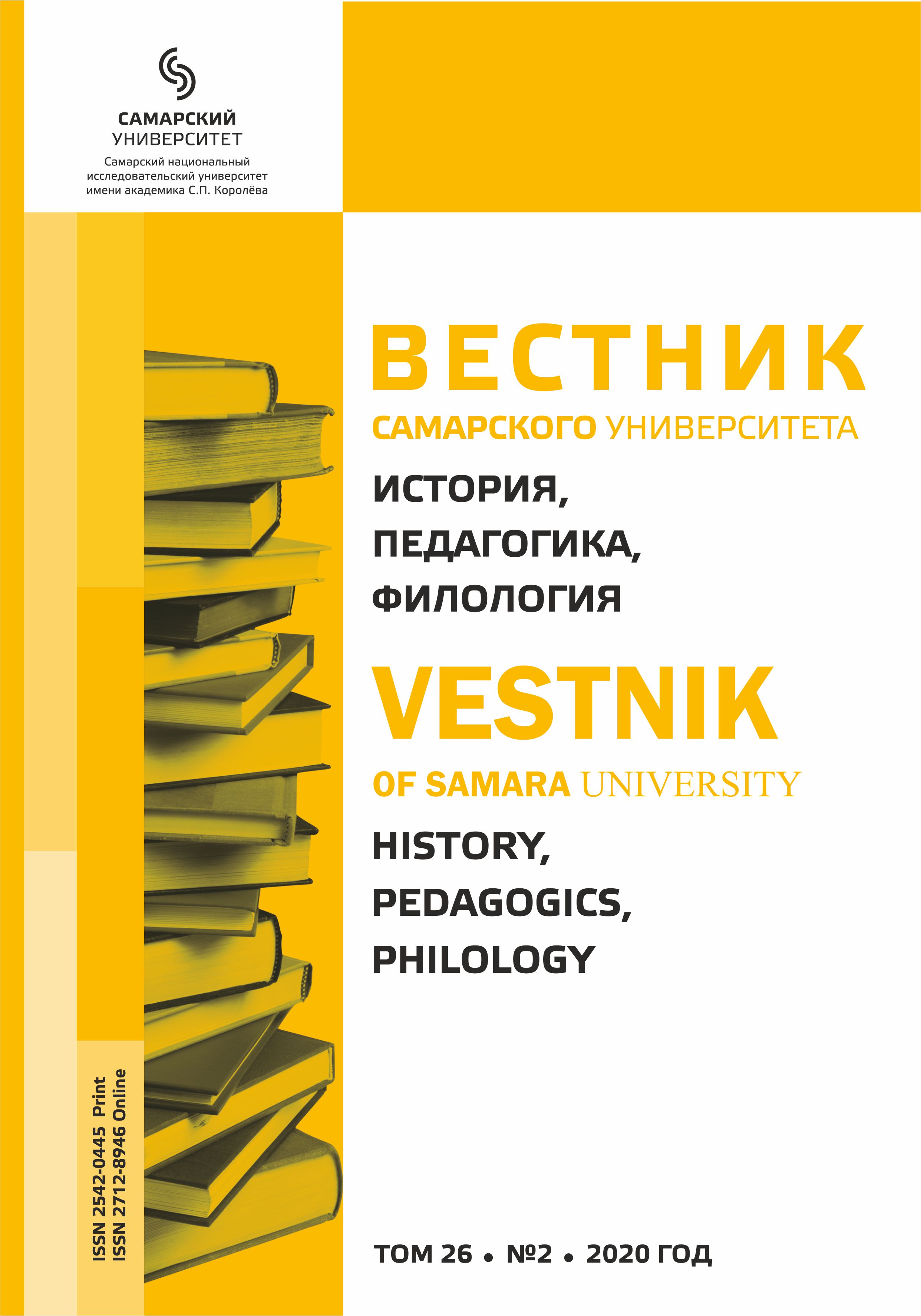Acmeological resources of personal development in the paradigm of humanistic pedagogy
- Authors: Kurylenko L.V.1
-
Affiliations:
- Samara National Research University
- Issue: Vol 26, No 2 (2020)
- Pages: 90-94
- Section: Articles
- URL: https://journals.ssau.ru/hpp/article/view/7877
- DOI: https://doi.org/10.18287/2542-0445-2020-26-2-90-94
- ID: 7877
Cite item
Full Text
Abstract
The article explores the problem of interaction of the individual and society, which together determines the identification and differentiation of the unique and universal personality with the goal of proportional development of the individual in society. The necessity and possibility of developing a unique and universal personality are proved on the basis of the principles of harmony and unity. It is argued that the proportional development of the individual in society is ensured by acmeological postulates that act as a trigger mechanism. The acmeological conditions of personality development are proposed and substantiated, relying on the idea of harmonizing the unique and universal in the personality, the role of which is played by the conditions: for the growth of the personality’s self, development of its emotional sphere, creation of a favorable environment and conditions for the person to master the system of social roles. Together, they all represent the acmeological resources of personality development. As a result of identifying and arguing the group of acmeological conditions for the development of personality, a number of patterns are identified that help to solve the problems of harmonious development of the personality against the background of the universal and identification of uniqueness of personality with the universal.
About the authors
L. V. Kurylenko
Samara National Research University
Author for correspondence.
Email: morenov@ssau.ru
ORCID iD: 0000-0001-8602-0659
Doctor of Pedagogical Sciences, professor, head of the Department of Theory and Technology of Social Work
References
- Allport 1968 – Allport G.W. (1968) The person in psychology: Selected essays. Boston: Beacon Press, 345 p. Available at: http://psyberia.ru/book/allport.pdf.
- Bandura 1982 – Bandura A. (1982) Self-efficacy mechanism in human agency. American Psychologist, vol. 37, no. 2, pp. 122–147. Available at: https://pdfs.semanticscholar.org/8bee/c556fe7a650120544a99e9e063eb8fcd987b.pdf.
- Dewey 1968 – Dewey D. (1968) Freedom and culture. Intro. R. Redlich. London: Overseas publication interchange, LTD, 195 p. Available at: https://archive.org/details/dewey_freedomculture.
- Kelly 1963 – Kelly L. (1963) A theory of personality. The psychology of personal constructs. New York, 208 p. Available at: http://bookre.org/reader?file=1067197.
- Abulkhanova-Slavskaya 1974 – Abulkhanova–Slavskaya K.A. (1974) Correlation of individual and social as a methodological principle of personality psychology. In: Shorokhova E.V. (Ed.) Theoretical problems of personality psychology. Moscow: Nauka, pp. 34–82. Available at: http://bookre.org/reader?file=597575&pg=1. (In Russ.)
- Bitinas, Bocharova 1993 – Bitinas B.P., Bocharova V.G. (1993) Social education of students. In: Experience in developing concepts of education. Parts 1-2. Rostov-on-Don: Izd-vo RGU, 1993, Part 1, pp. 86–111. (In Russ.)
- Vulfov, Semenov 1995 – Vulfov B.Z., Semenov V.D. (1995) School and social environment: interaction. Moscow: Znanie, 1995, 111 p. (New in life, science, technology. Series «Pedagogy and psychology», no. 12.) (In Russ.)
- Derkach 2010 – Derkach A.A. (2010) Self-realization is the basis of acmeological development. Moscow: MODEK, 224 p. (In Russ.)
- Karpey 1995 – Karpey J. (1995) Toward a New Perspective of Understanding in the Classroom. In: Krylova N.B. (1995) New values of education: 10 concepts and essays. Moscow: Innovator, no. 3, pp. 38–45. Available at: http://vestnik.yspu.org/releases/obrazovanie_za_rubegom/4_3. (In Russ.)
- Karpova, Kurylenko 2007 – Karpova Yu.V., Kurylenko L.V. (2007) An environmental approach to the training of social work specialists. Samara: Izd-vo «Samarskiy universitet», 164 p. (In Russ.)
- Kurylenko 2001 – Kurylenko L.V. (2001) The system of individual and personal development in innovative educational institutions. Moscow: Izd-vo «Mezhdunarodnaya pedagogicheskaya akademiya», 208 p. (In Russ.)
- Manuylov 2002 – Manuylov Yu.S. (2002) Environmental approach to education. Pedagogy, no. 7, pp. 36–41. (In Russ.)
- Merlin 1990 – Merlin V.S. (1990) Personality and society. Perm: Izd-vo PGPI, 90 p. (In Russ.)
- Orlov 1995 – Orlov A.B. (1995) The personality and the essence: Inner and outer «Self» of human being. Voprosy Psychologii, no. 2, pp. 5–19. Available at: http://www.voppsy.ru/journals_all/issues/1995/952/952005.htm. (In Russ.)
- Platonov 1986 – Platonov K.K. (1986) The structure and development of personality. Moscow: Nauka, 255 p. (In Russ.)
- Rubinstein 1976 – Rubinstein S.L. (1976) Problems of general psychology. Moscow: Pedagogika, 416 p. Available at: https://psychojournal.ru/books/2014-rubinshteyn-s-l-problemy-obschey-psihologii.html. (In Russ.)
- Selezneva 2004 – Selezneva E.V. (2004) The development of acmeological culture of personality. Moscow: Izd-vo RAGS, 259 p. (In Russ.)
- Talanchuk 1995 – Talanchuk N.M. (1995) System-synergetic concept of pedagogy. Professional education (Kazan Pedagogical Journal), no. 1, pp. 49–58. (In Russ.)
- Ushinsky 1990 – Ushinsky K.D. (1990) Man as a subject of education. In: Ushinsky K.D. Pedagogical works: in 6 vols. Vol. 5. Complier S.F. Egorov. Moscow: Pedagogika, 528 p. Available at: https://static.my-shop.ru/product/pdf/177/1766860.pdf. (In Russ.)
- Furnham, Heaven 2001 – Furnham A., Heaven P. (2001) Personality and Social Behavior. Saint Petersburg, 386 p. Available at: https://b-ok.cc/book/2652065/f380a8. (In Russ.)
Supplementary files













